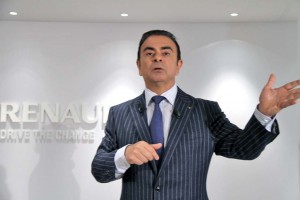They may little more than an asterisk on the sales charts, right now, but battery cars will account for as much as 10% of the market by 2020 – or so predicts Nissan CEO Carlos Ghosn, one of the industry’s most unabashed promoters of zero-emissions technology.
A little more than year after the launch of the Japanese maker’s battery-electric Leaf, sales appear to be lagging behind plans, the Nissan BEV, or battery-electric vehicle, generating just 579 sales in March – or barely half what it hit at peak last year. That number – along with the weak performance by other electric vehicles has left many wondering whether the technology just doesn’t turn on consumers.
Not Ghosn. He remains as committed as ever, as he made clear during a keynote speech at a conference in New York City sponsored by consulting firm IHS and the National Automobile Dealers Association. “Am I still bullish on electric vehicles? Yes,” he proclaimed.
Nissan officials downplay the weak numbers for Leaf so far this year by stressing that they have begun to offer the little battery car in a variety of new markets. Production will remain limited for a while. Critical will be the launch of production at a new battery car facility alongside Nissan’s existing assembly plant in Smyrna, Tennessee.
Add in that operation and plans for battery car production by Nissan’s French alliance partner Renault and they will collectively share capacity to build as many as 400,000 of the vehicles annually.
Renault – where Ghosn also serves as CEO – is also in the process of rolling out new battery-electric models. And Nissan’s Infiniti division will introduce an all-new luxury BEV at the NY Auto Show, this week. That model will share its basic platform and powertrain with Leaf but, as TheDetroitBureau.com previously reported, it will feature a unique, sportier body, as well as a larger battery pack and will deliver more aggressive performance than the Nissan model.
Though Leaf sales might be down, there is some sign of momentum in the electric vehicle market. Sales of the Chevrolet Volt surged to 2289 last month. That’s about 50% up from the Chevy plug-in hybrid’s previous best month, last December, when it rang up 1,529 sales. More significantly, it marks a sharp reversal of fortunes for the General Motors offering.
GM was stung by reports that several Volt battery packs caught fires following federal crash tests last year. The National Highway Traffic Safety Administration launched and then quickly called off an investigation, appearing to validate GM’s claims that the problem was largely the result of improper testing procedures. The maker nonetheless made changes to further improve the crashworthiness of the battery pack.
But Volt got caught up in the ongoing political debate over the 2009 General Motors bailout. The negative headlines appeared to discharge demand which, in January and February, briefly collapsed. That forced GM to order a 5-week shutdown of Volt production.
But the March numbers suggest the maker might be coming closer to meeting its goal of selling as many as 45,000 of the Volts in the U.S. this year if the upward trend continues. Meanwhile, GM’s European Opel subsidiary reports it has already seen strong demand for the similar Ampera plug-in. It claims to now have 7,000 orders in hand.
While Leaf and the Chevrolet Volt have been portrayed as having a pitched battle they target somewhat different consumers. Leaf is a pure battery-electric vehicle and has a range of under 100 miles per charge. Volt gets around 30 miles per charge but can then keep going by firing up its onboard four-cylinder gasoline engine. The trade-off is a significantly higher price – something recent studies caution is limiting demand for the plug-in.
But the higher fuel prices go, the more consumers appear to be taking a closer look at alternatives – from basic hybrids like the Toyota Prius all the way to pure BEVs.
And motorists will be getting a lot more options. Along with the Infiniti battery car, showgoers in New York will see a variety of other new electric vehicles, including the Tesla Model S, which hits showrooms later this year and can offer an extended 300-mile battery pack. Plug-in maker Fisker Automotive unveiled a new model of its own Tuesday night, the mid-range Atlantic.
Mainstream manufacturers including Ford, Toyota and Honda will launch BEVs and plug-ins this year and BMW will soon launch sales by its dedicated electric vehicle brand with models such as the i3 electric and i8 plug-in.
Proponents believe the proliferation of product will help drive a rapid expansion of the battery market. Skeptics, however, want that this could just mean a lot more manufacturers losing money on products the public doesn’t really want.

